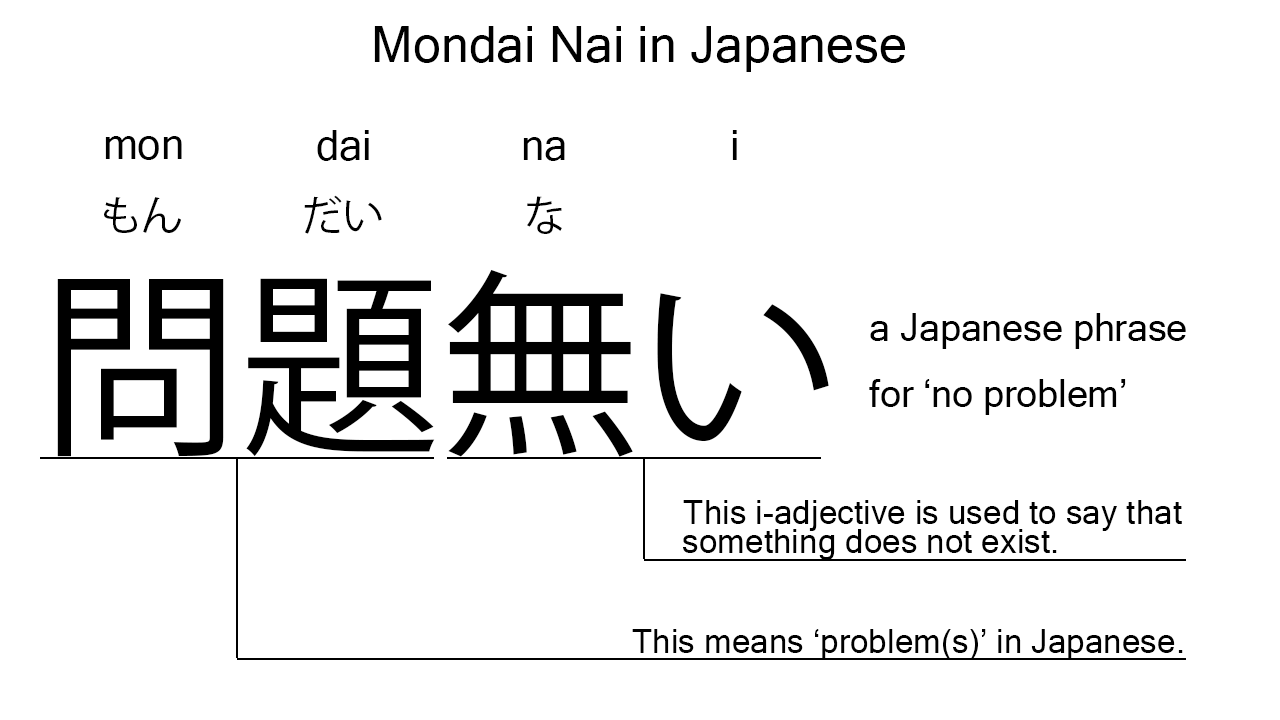What does “mondai nai” mean in Japanese?
Native speakers say “mondai nai” often to mean ‘no problem’ in Japanese. Perhaps, some Japanese learners know this phrase as it is sometimes used in Japanese movies, novels, manga, anime, and the like. In this blog post, however, I will explain this phrase in detail based on its grammatical components. And also, I will explain how to use it through an example sentence. My explanations would help Japanese learners understand “mondai nai” more clearly. Then, let’s get started!
Contents
Definition and meanings of “mondai nai”
Let me start with the definition and meanings of “mondai nai”.
- mondai nai – 問題無い (もんだいない) : a phrase meaning ‘no problem’, ‘all right’, or such in Japanese.
The definition and meanings are not that difficult. The meanings seem to be based on very similar concepts. To understand this phrase more clearly, however, let me explain its grammatical components in detail, one by one.
What does “mondai nai” literally mean in Japanese?
The phrase consists of the following two components:
- mondai – 問題 (もんだい) : a noun meaning ‘problem’ in Japanese. This can also work as plural. Learn more about Japanese plural.
- nai – 無い (ない) : an i-adjective used to say that something does not exist. In the phrase, this is used to deny the existence of problems.
These two components tell us that the formed phrase literally means ‘there is no problem’ in Japanese. This literal interpretation is completely in line with the actual meanings.

When we meet new Japanese phrases, we should check their grammatical components in detail to understand their meanings clearly and deeply. In many cases, components tell us a lot about the meanings of the phrases they form. Actually, here, we could get the better understanding of “mondai nai” through the detailed check above.
So far, I’ve explained the definition and meanings of “mondai nai” together with its grammatical components. Then, let me explain how to use it through the example sentence below.
Example: how to say “no problem” in Japanese
「zenzen mondai nai」 to boku wa kanojo ni it ta – 「全然問題無い」と僕は彼女に言った (「ぜんぜんもんだいない」とぼくはかのじょにいった)
“No problem at all,” I said to her.
Below are the new words used in the example sentence.
- zenzen – 全然 (ぜんぜん) : an adverb used in a negative sentence for emphasis. In the example, this is used to add the meaning of “at all”.
- to – と : a case particle working as a quote marker. In the example, this works after the clause to indicate what the speaker said to her.
- boku – 僕 (ぼく) : a pronoun meaning ‘I’ in Japanese. This is used mainly by boys and young males.
- wa – は : a binding particle working as a case marker or topic marker. In the example, this works after “boku” to make the subject in the sentence.
- kanojo – 彼女 (かのじょ) : a pronoun meaning ‘she’ in Japanese.
- ni – に : a case particle used to say in which direction an action goes. In the example, this is used after “kanojo” to say to whom the speaker said.
- it – 言っ (いっ) : one conjugation of the verb, “iu“, which means ‘to say’ in Japanese. In the example, it has been conjugated for the better connection with its following word.
- ta – た : an auxiliary verb used after a verb, adjective, or auxiliary verb to make its past tense form. In the example, this is used after “it” to make its past tense form, “it ta”.
This is a typical usage of “mondai nai”. In this example, it works together with the adverb, “zenzen”, to mean ‘no problem at all’ in Japanese. When we want to mean ‘no problem’ in Japanese, anyway, this phrase is always a very good option.
Summary
In this blog post, I’ve explained the definition and meanings of “mondai nai” in detail based on its grammatical components. And also, I’ve explained how to use it through the example sentence. Let me summarize them as follows.
- mondai nai – 問題無い (もんだいない) : a phrase meaning ‘no problem’, ‘all right’, or such in Japanese. This phrase literally means ‘there is no problem’ in Japanese. This literal interpretation is completely in line with the actual meanings.
Hope my explanations are understandable and helpful for Japanese learners.